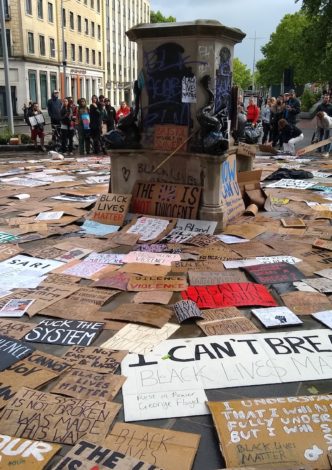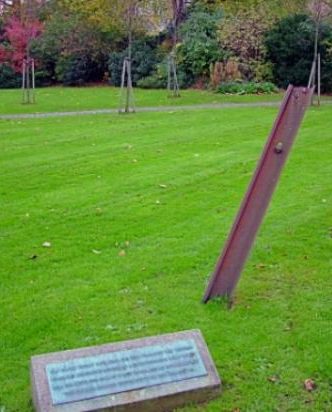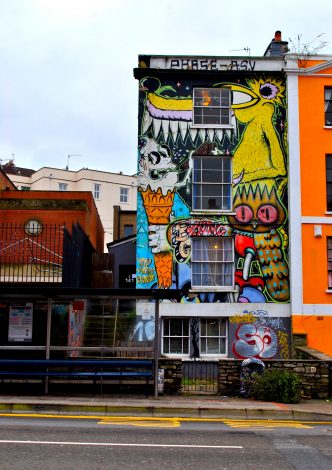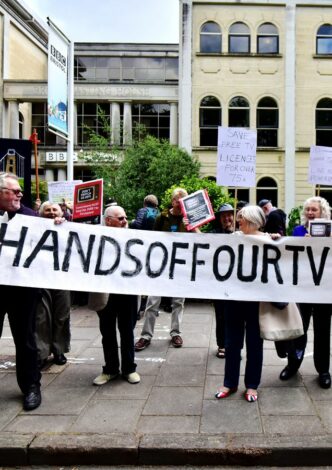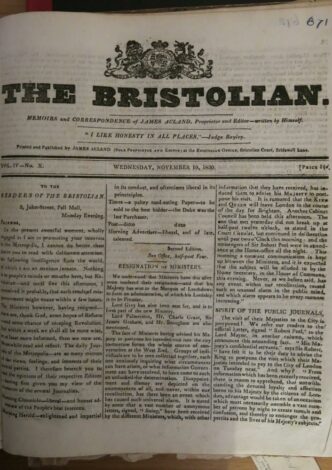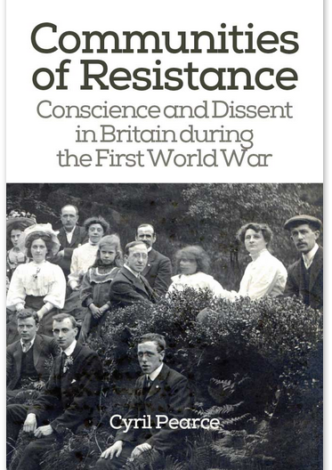 If you are Glad Colston’s Gone – support the Colston Topplers Defence Fund!
If you are Glad Colston’s Gone – support the Colston Topplers Defence Fund!
One year on from the fall of the Edward Colston statue from it's pedestal during the Black Lives Matter protest on 7 June 2020, there's been another media feeding frenzy focused on Bristol. The iconic statue toppling event continues to buzz around the world's newswires. But let's not forget that some participants in that event remain severely under pressure from the British state and its lackeys with a Crown Court trial due to start on 13 December 2021. We support the call to #DropTheCharges. We […]
Introduction During the furore about the renaming of the Colston Hall in 2017 a number of angry letter-writers to the Bristol Post claimed that the recent protests over Edward Colston were merely a ‘flash in the pan’ and a product of ‘woke’, faddist politics propagated by people from outside Bristol. This attempt to reduce the actions of groups and movements like Countering Colston and Black Lives Matter to a particular historical moment whilst the great weight of a supposed ‘tradition’, such as […]
During World War Two the Nazis dropped bombs on two of the battlegrounds of working-class Bristolian resistance to Oswald Mosley and his notorious fascist paramilitaries, the ‘Blackshirts’. From the Ropewalk to Melvin Square this project investigates the heroes and villains of inter-war class conflict and reveals the proud history of Bristolian anti-fascism from the very beginnings of the British Union of Fascists (BUF). This project aims to answer some important questions: Why did significant […]
So much of what we love about Bristol was made possible by squatting. Bristolians have taken over buildings and public spaces for housing, protest, art, gigs, raves, libraries, food and laughter from Leigh Woods to Easton. We’ve squatted in the aftermath of the Second World War, during the Miners’ Strike and in response to 21st Century austerity. But the memory of squatted spaces is all too easily lost to eviction and criminalisation. This project seeks to map when, where and why we and […]
In recent years there have been many initiatives to celebrate the contribution of particular groups in Bristol’s history, but we know a lot of good people and achievements are excluded or forgotten, including older people. We plan to bring their contributions to life to celebrate and share by collecting and publishing their oral histories through the Activists’ Memories project. The project is a collaboration between Bristol Older Peoples’ Forum (BOPF) and Bristol Radical History Group (BRHG) […]
In 1827, radical journalist James Acland launched the West Country’s first daily newspaper. He called it The BRISTOLIAN. Undercutting the advertising rates of existing weekly papers, conducting a lively letter column and breaking the law by publishing at one and a half pence without paying the newspaper stamp tax, Acland’s publication was a muck-raking popular radical paper for the working classes. The paper concentrated on exposing the abuses both of the unreformed Corporation which ran Bristol […]
Emma Byron and Trevor Houghton present the story of a network of neighbours, workmates, families and comrades who stood together and refused to take their part in the war machine. Steps Against War is an innovative micro-history of resistance to war in a working-class district of south Bristol. The book grew out of a community project to create a history walk with puppets, and the talk will be illustrated with short videos and images of puppetry, as well as pictures from Bedminster in the […]
The first in our series of Christmas Webinars.... Acclaimed novelist and short-story writer Angela Carter lived in Clifton during the 1960s, where she wrote her early novels known as the 'Bristol Trilogy'. Steve Hunt will introduce some of the themes of his new Bristol Radical History Group Book: Angela Carter's 'Provincial Bohemia'; the Counterculture in 1960s and 1970s Bristol and Bath with a journey through the places and times that inspired her breakthrough works. You can join this one hour […]
 Not A BRHG Event
Not A BRHG Event
Stephen E. Hunt of Bristol Radical History Group will be presenting an online tour, based on the Bristol Radical History Group publication Angela Carter's Provincial Bohemia': The Counterculture in 1960s and 1970s Bristol and Bath. This event is part of Being Human 2020, the national festival of the humanities. Angela Carter was one of the late 20th century’s most acclaimed novelists and came of age as a writer in 1960s Clifton, where she experienced life in post-war Bristol, looking at a […]
An excellent new book Communities of Resistance has just been published which takes a systematic look at the networks of war resisters connected to conscientious objectors in World War One. Based upon a nationwide survey of COs it appears Bristol was a hot spot of war resistance as the author, Cyril Pearce, explains: The work which has resulted in this new book, Communities of Resistance, began almost twenty years ago in a study of the 1914-1918 anti-war movement in Cyril Pearce's home town of […]
 If you are Glad Colston’s Gone – support the Colston Topplers Defence Fund!
If you are Glad Colston’s Gone – support the Colston Topplers Defence Fund!
